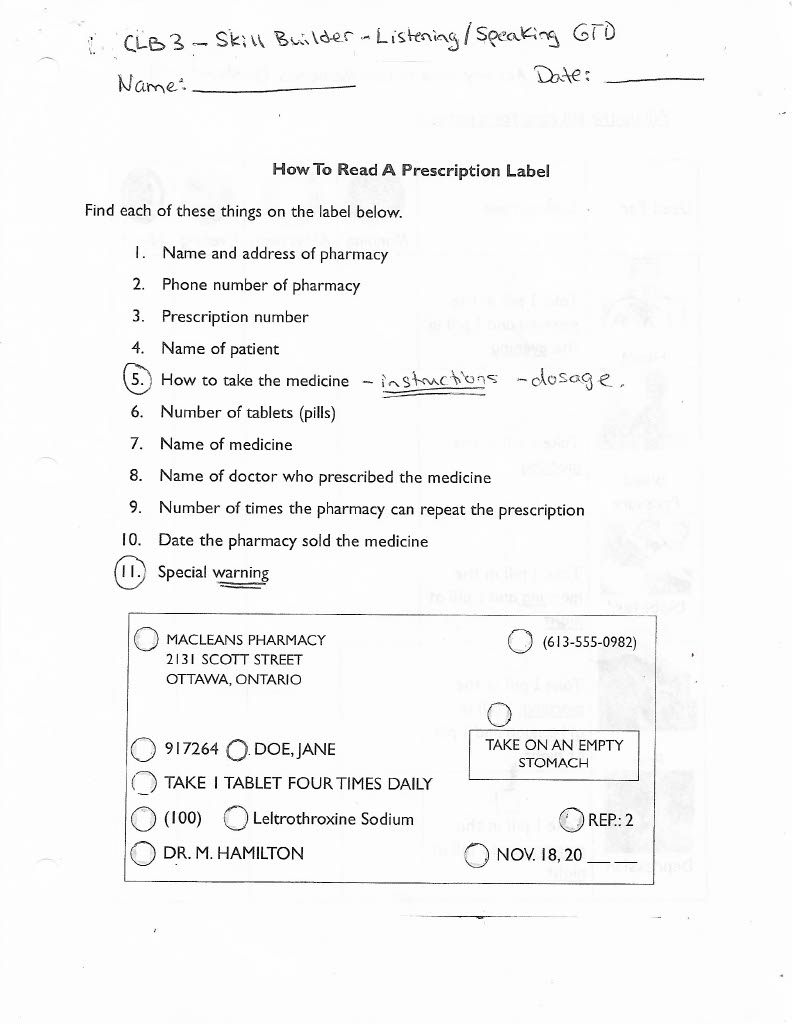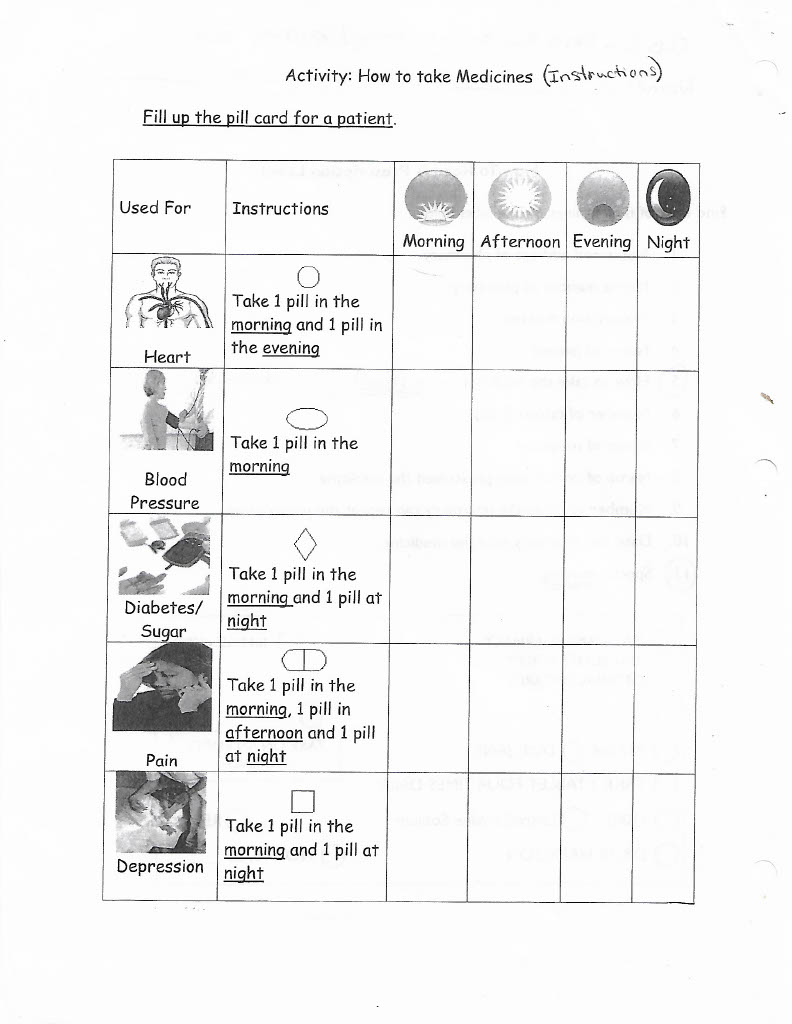 Adult Education
Adult Education
Classroom Excerpts
Distinguishing Modal Verbs to Communicate about Medicine: Advice, Instruction, and Warning
In the following video, Karin helps her learners delve into and utilize their funds of knowledge by asking them questions to elicit answers. According to Suzuki (2004), out of various types of corrective feedback practices, which include clarification, repetition, and explicit correction, “the most successful type of feedback leading to students’ repair [is] elicitation” (p. 5). Karin uses elicitation as a means of correction and to check learners’ knowledge and include them in a whole-class discussion about the lesson. She begins by questioning her adult learners about medicine and why sometimes medication may be needed. She also elicits words and phrases categorized under advice, instructions, warnings, and modal verbs and simple verbs related to administering and taking medicine. Karin also questions her adult learners about the difference between advice, instructions, and warnings. While eliciting learners’ answers, Karin reminds them to assess what kind of information they need and how to arrive at their answers. Karin explicitly tells these adult learners to think about what information they might find on a pill bottle and what information they already know. By explicitly asking adult learners about information and where they might find it, Karin is asking learners to practice the question-answer relationship (QAR) strategy, which allows learners to answer questions by having them think about where they might find the answers to their questions.
Throughout her introduction to the lesson, Karin makes a note to structure the conversation and the lesson activities per common adult concerns such as medical care for children, taking and administering medication based on the instructions found on pill bottles and various scenarios. Karin demonstrates that she is aware of her learners’ dynamic roles as adult learners, caregivers, and parents.
Realia for English-as-an-Additional-Language Adult Learners: Medicine Bottles
In writing about improving students’ vocabulary, Sukrina (2010) writes in disfavour of the arbitrary nature of vocabulary lists and memorization and advocates utilizing realia to improve students’ language understanding and retention. Sukrina defines realia as “a term used in library science and education to refer to certain real-life objects” (2010, p. 15). Sukrina continues, “A teacher of a foreign language often employs realia to strengthen students’ associations between words for everyday object and the object themselves” (2010, p. 20). By using realia in the form of medicine bottles, Karin engages adult learners in authentic learning.
To improve student understanding of the lesson’s instructions and activities, Karin models answering lesson worksheets and performing required tasks on the whiteboard while also eliciting information and vocabulary from learners. As a result, adult learners receive oral and visual instructions while engaged in an interactive discussion. In the following video, Karin scaffolds the language of Advice, Instruction, and Warning Labels on pill bottles.
The following is the “How to Read A Prescription Label” worksheet completed by adult learners in the above video.

Instructions on Pill Bottles
In the following video, Karin engages learners in active participation by asking them questions to elicit answers that showcase their understanding of medicine bottles’ instructions and dosages. Before setting learners on their lesson activity, Karin models how to use the graphic organizer to categorize information presented on medicine bottles. In discussing the importance and effectiveness of graphic organizers, Egan (1999) advocates for graphic organizers “as one of the “things” that can be used to make learning more meaningful” (p. 641) because they can “make information more apparent, distinct, and articulate for the learner” (p. 641).
The following is the “How to take Medicines” activity worksheet completed by adult learners in the above video.

Warnings on Pill Bottles
In the following video, Karin and her adult learners discuss pertinent vocabulary when speaking about medicine and the possible side effects of taking medication. It is important to note that Karin teaches lessons that empower learners to live well within a large English-speaking society. As Kress writes, “Learning is the result of a semiotic/conceptual/meaning-making engagement with an aspect of the world; as a result of the learner’s semiotic/conceptual resources for making meaning and, therefore, for acting in the world, are changed – they are augmented” (2010, p. 174). Thus, to Karin’s adult learners, language, rather than arbitrary and abstract, is instantly transferable between the classroom and their communities. Moreover, by modelling the lesson activity on the board, Karin engages her learners in visual, oral, and linguistic modes to reinforce new knowledge. Adult learners in Karin’s class work with the medicine bottles (realia) to identify written instructions and warnings and engage in oral discussion with their classmates to solve the lesson worksheet.
Situational Approach to Learning about Warning Labels
The following video presents another approach to teaching about warning labels on medicine bottles through situational problem-solving. Unlike the structural approach, the situational approach to language learning involves presenting information and language that engages adult learners meaningfully, without strong concern for linguistic difficulty (Celce-Murcia, 2001).
While projecting the worksheet on the whiteboard, Karin elicits information, definitions, and synonyms from adult learners as they look at the first warning label presented on their lesson worksheet. In a discussion about the principles and the importance of teaching problem-solving skills, Foshay and Kirkley (2003) state, “Problem-solving has become the means to rejoin content and application in a learning environment for basic skills as well as their application in various contexts” (p. 1). By studying warning labels situationally, adult learners can apply their newfound knowledge to other aspects of their lives and other situations they may experience regarding taking medication. Adult learners also come to understand that language is always socially situated and negotiated depending on the context that they are in. The way one might discuss medicine varies depending on if you are asking a pharmacist about a drug; explaining symptoms to a doctor; or coaxing a young child to take awful tasting medicine.
Realia for English-as-an-Additional-Language Adult Learners: Continuing the Exploration
In the following video, adult learners continue to use realia (medicine bottles) to read written instructions and warnings found on the bottles. Students explore various medicine bottles and collect several pieces of information such as prescription number, where to find it, name of medication, dosage instructions, and warnings on labels. According to Herrell and Jordan (2016), “Realia are used to provide students with opportunities to build on their learning using all their senses” (p. 42) by allowing students to use new vocabulary meaningfully and contextually. Accordingly, rather than having adult learners memorize vocabulary lists related to medicine, Karin allows learners to explore medicine bottles to gather important information they need to know how to read and instructions they need to follow. Such activity can teach new vocabulary and help learners gain the critical skill of assessing, reading, and following the directions found on prescription bottle labels.
Adult learners in Karin’s class can consult their peers, their educator, or their cellphones for assistance during the activity. During a study on cooperative learning strategies and methods, Holland and Muilenburg (2011) found that cooperative learning improved problem-solving skills, promoted self-esteem, and helped students develop “interpersonal and small group skills” (p. 2). While the adult learners are conversing and working together to fill in their worksheets, Karin moves between groups to monitor student progress, provide encouragement, check understanding, and provide feedback in a personable manner. Clearly, there is a positive, animated mood amongst the learners and a high level of comfort in asking Karin questions.
Visual Clues in Reading Warning Labels
Jewitt (2006) (as cited by Serafini, 2014), writes, “Learning increasingly involves students in working across different sites of expression, negotiating and creating new flexible spaces for planning, thinking, hypothesizing, designing, and realizing ideas” (p. 91). Karin allows her adult learners to enhance their reading abilities of the target language, English, with specific vocabulary and concepts (i.e. prescription number, warning label, dosage) by working with medicine bottles (realia), which allows learners to gain an understanding of the language by reading visual clues such as the shape and colour of the warning labels.
Reinforcing Concepts with an Individual Learner
In the following video, Karin offers adult learners one-on-one student feedback by checking in with students to offer personalized engagement during the lesson activity. Karin’s personalized feedback to learners working individually or in pairs reinforces strategies and skills to attain knowledge and retain information and language. Engaging in quick stops to check in with students during lesson activities allows for meaningful learning and encouragement. Grasha (2002) concurs and states that meaningful feedback and checking in with learners during activities promotes learners’ engagement, communication, and rapport between the educator and the learners.
Meaning-Making Process: Peer Assessment Combines Reading, Writing, Viewing, Listening, and Talking
Scarino and Liddicoat (2009) write, “Learning involves a process of making connections – reorganizing unrelated bits of knowledge and experience into new patterns, integrated wholes” (p. 26). Similarly, the following video showcases a whole-class conversation about various types of medications and warnings on medications. Such classroom discussions inspire peers to assess one another’s understanding of the lesson and the accompanying task. This type of conversation allows learners to draw upon their multimodal lesson activities where they used visual, oral, linguistic, and auditory literacies to engage in a whole-class discussion that contributes to the meaning-making process. Moreover, when Antoine, an adult learner, comments that he takes the same form of medication that Karin’s mother takes, a class discussion emerges that enhances the immediate relevancy of the conversation. This adult learner-initiated conversation allows learners to orally share their experiences and thoughts on the topic, which leads to a more in-depth conversation about medicine-sharing problems and encourages learners to share their personal experiences.
Important Functional Literacy Skills about Medicine
According to Kagitcibasi, Goksen, Gulgoz (2005), “functional literacy is an emancipatory practice that requires people to read, speak, and understand a language” (p. 472) for everyday purposes. Functional literacy moves beyond the ability to read and write and maintain grammatical precision to include “semantics rooted in everyday exchanges” (Kagitcibasi, Goksen, Gulgoz, 2005, p. 473). Similarly, in Karin’s class, adult learners receive engaging and interactive lessons and activities that allow them to practise language contextually and meaningfully. Kagitcibasi, Goksen, Gulgoz (2005) argue that when language is taught to extend beyond the passive focus on grammar and vocabulary, learners become empowered and confident in their ability to use new language practises in everyday life, across various situations. Adult learners often hold various responsibilities in their daily lives, and functional literacy can help them prepare for these very real, important, and immediate responsibilities accordingly.
Adult learners in Karin’s class gain functional literacy skills about medicine to help them fulfill their roles as caregivers.
Building Rapport with Adult Learners
Adult language learners enrolled in the Language Training Program are treated as adults. Karin begins class by addressing adult learners’ pertinent issues such as children staying home due to an ongoing strike. Karin is well aware of the learners’ roles as parents and caregivers. After careful reflection, Starcher (2011) found that intentionally building rapport with learners by relating to them, their lives, and interests improved classroom discussion and overall student engagement. Moreover, during the lesson’s introduction about advice, warnings, and instructions about medicine, Karin does not presume that one of her adult learners is not already a doctor and teaches her lessons in a way that empowers students by delving into their funds of knowledge. Karin reviews some essential facts and information they learned in previous classes with her learners and extends to preview upcoming topics and lessons.
In the following video, Karin builds rapport with her adult learners by asking them about their plans for the weekend and sharing hers. By taking interest in her students’ lives and letting them into hers in such a manner, Karin nurtures a friendly classroom environment that encourages oral communication skills.
Visit Karin’s blog: mcclabc.blogspot.com